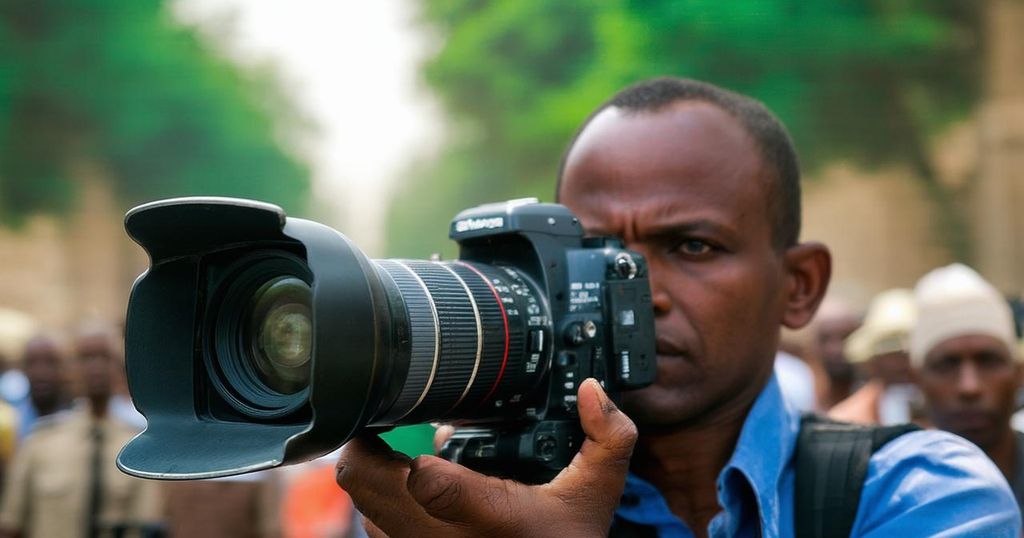Urgent Appeal to Egypt: Halt Deportation of Sudanese Journalists

Reporters Without Borders urges Egypt to stop the deportation of four Sudanese journalists detained since September, citing grave dangers they face if returned to Sudan. The journalists were arrested while interviewing a human rights advocate and currently hold asylum seeker cards. Their situation poses significant risks to their safety, reflecting broader issues of press freedom and asylum in conflict regions.
Reporters Without Borders, an international organization advocating for journalism and press freedom, has urgently called upon Egyptian authorities to cease the imminent deportation of four Sudanese journalists detained since September. The journalists are currently held at a refugee center in Aswan, situated on the Egypt-Sudan border. The organization emphasizes grave concerns regarding the safety of these journalists, as they face severe risks should they be returned to Sudan, a nation marked by hostility towards media professionals. These journalists, whose identities remain undisclosed, were apprehended on September 23 while producing an interview with exiled Sudanese human rights advocate Mohamed Hassan Bouchi for the Sudanese television channel Sudan Bukra. Despite possessing temporary asylum seeker registration cards issued by the United Nations High Commissioner for Refugees (UNHCR), they had fled Sudan due to violence and persecution from both conflicting factions of the ongoing civil war. Legal counsel assisting the detained journalists, Iqbal Ahmed Ali, has highlighted inconsistent and chaotic judicial processes, whereby the journalists have oscillated between fears of deportation and hopes for refuge in a more secure country such as Uganda. Unfortunately, on October 22, the situation deteriorated when the journalists were transferred to a military prison in Aswan, a move indicated to prepare for their deportation by land. Jonathan Dagher, head of Reporters Without Borders Middle East Desk, stated, “These four refugee journalists should not be detained or deported for doing their jobs: covering a war they can no longer document from their home country due to the imminent danger to their lives. Sending these media professionals back to Sudan would not only constitute a flagrant violation of their right to safety but would put them in grave danger, given the reprisals they would be exposed to. We call on the Egyptian authorities to halt the deportation procedure. These journalists must be released and their protection guaranteed.” As of 2024, Egypt is ranked 170th out of 180 nations on the World Press Freedom Index released by Reporters Without Borders, while Sudan holds the 149th position. The ongoing conflict in Sudan has severely crippled the media landscape, making it increasingly perilous for journalists to operate freely. During a recent panel discussion at the Free Press Live 2024 event held in The Hague, Rashid Saeed from Radio Dabanga noted the severe impacts of the conflict since its onset in April 2023, stating, “Since the outbreak of the current conflict between the Sudan Armed Forces (SAF) and the paramilitary Rapid Support Forces (RSF) in April 2023, 90 per cent of the infrastructure of media institutions has been destroyed, journalists have been killed, targeted, detained, tortured, or forced to flee abroad… We can be independent, but we cannot be neutral, and our priority must be to bring a stop to the war in Sudan.”
The expulsion of journalists has raised critical concerns regarding press freedom and the treatment of individuals seeking refuge from oppressive regimes. Egypt’s handling of the Sudanese journalists exemplifies the precarious situation faced by media professionals in regions afflicted by ongoing conflict. Sudan’s war has intensified the threats to journalists, leading to a drastic decline in the ability to report safely. The detention and potential deportation of the Sudanese journalists who fled such an environment reflect broader issues surrounding human rights and the obligations of host countries regarding asylum.
In summary, the call by Reporters Without Borders for Egyptian authorities to halt the deportation of Sudanese journalists underscores the importance of safeguarding the rights of media professionals amid ongoing conflicts. The treatment of these journalists highlights the intersection of journalism and asylum, revealing the perilous conditions in regions like Sudan. The need for international support and protection for journalists is urgent, as their safety is paramount in maintaining the integrity of reporting in conflict zones.
Original Source: www.dabangasudan.org








